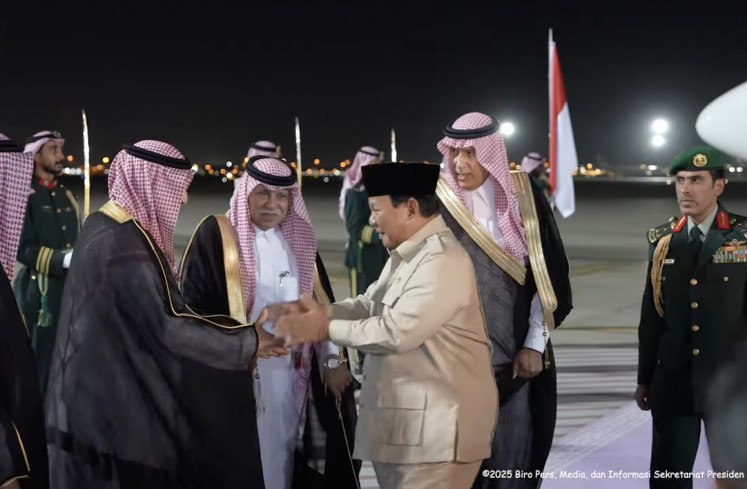Popular Reads
Top Results
Can't find what you're looking for?
View all search resultsPopular Reads
Top Results
Can't find what you're looking for?
View all search resultsASEAN mum over Brunei’s harsh anti-gay legislation
Traditional values: A photographer takes pictures of a newlywed couple at the Sultan Omar Ali Saifuddien mosque in Bandar Seri Begawan on April 1
Change text size
Gift Premium Articles
to Anyone

T
raditional values: A photographer takes pictures of a newlywed couple at the Sultan Omar Ali Saifuddien mosque in Bandar Seri Begawan on April 1. The United Nations condemned on Monday new "cruel and inhuman" laws set to take effect in Brunei this week that impose death by stoning for gay sex and adultery, and amputations for theft.(AFP/Brunei Out)
ASEAN has remained tight-lipped over Brunei’s harsh new law that includes death by stoning for adultery and gay sex, which resulted in a storm of global criticism from politicians, celebrities and rights groups.
Malaysia’s representative to ASEAN, Shariffah Norhana Mustaffa, said the law fell under Brunei’s internal affairs, so it was important that ASEAN countries uphold its non-interference policy.
“Sharia is actually not that easy [to abuse]; it has conditions. So things are not clear, especially in the West — they don’t know about [our] traditions and whatnot,” Mustaffa said on the sidelines of a seminar at the University of Indonesia in Depok, West Java, on Thursday.
Indonesian officials did not comment when asked for a response, while the regional organization’s ad hoc human rights body, the ASEAN Intergovernmental Commission on Human Rights (AICHR), is still coordinating in private.
The International Lesbian, Gay, Bisexual, Trans and Intersex Association (ILGA) in Asia has called on the government of Brunei to halt the implementation of the law and “engage in meaningful consultations with the communities most affected by the law, such as the LGBT community, women, as well as with other human rights bodies and experts”.
Brunei’s announcement also sparked protests online, with people such as British pop legend Elton John and American actor George Clooney calling for a boycott of Brunei-owned hotels in the United Kingdom, France and Italy, AFP reported.
More importantly, some critics believe that the tough penal code in Brunei could have a destabilizing effect in one of the most diverse regions in the world.
Southeast Asia is considered a beacon of multiculturalism because it is home to multiethnic and multireligious people from many major faiths — from Islam and Buddhism to Christianity, as well as all their minority variations.
Brunei’s permanent representative to ASEAN, Kasmalati Kassim, defended the decision of Brunei Sultan Hassanal Bolkiah, saying he had only carried out his duty as a Muslim leader by implementing the full extent of sharia.
She said people needed to understand the scope of the law, and that it was difficult to open a case against someone, let alone implement capital punishment.
“I know that sometimes they [will] not understand, but I do request that they respect us just like we respect them,” Kassim said.
Brunei’s insistence on implementing a discriminatory penal code on a national level would likely have a negative impact on Indonesia and Malaysia, two of its closest neighbors who happened to have a Sunni Muslim majority, said Human Rights Watch researcher Andreas Harsono.
“Brunei will help destabilize ASEAN by implementing ‘Islamist sharia’ a la ISIS,” he told The Jakarta Post on Friday, referring to another name for the Islamic State group.
Andreas said the move was also likely to cause a reaction in Myanmar, Thailand, Cambodia and Laos, which are all majority Buddhist countries with Muslim minorities.
“The region will be worse for wear if the sultan of Brunei closes his eyes to ASEAN’s stability,” he cautioned.
The HRW’s Andreas said as a country with the largest Muslim population in the world — even larger than conservative Saudi Arabia, which is the seat of Islam’s holy sites and who still maintains harsh sharia to this day — Indonesia should be leading the centuries-long discourse on Islamic jurisprudence.
“Sharia has many interpretations; it does not mean having to cut off someone’s hands or be punished with stoning [to death],” he said.
Indonesia’s western-most province Aceh is the only region that was given special autonomy to implement sharia in 2005, as part of a concession from the government to weaken armed separatists and bring an end to a three-decade insurgency.
Indonesian foreign policy of recent years has also placed greater importance on the protection of citizens abroad, a good portion of whom are rescued from countries that have tough sharia-based punishment, including the death penalty.
Religious conflict has already caused instability in Southeast Asia.
It is one of the most cited reasons for driving the conflict in Myanmar’s Rakhine state, which resulted in a military crackdown in 2017 that drove hundreds of thousands of Rohingya Muslims into neighboring Bangladesh.
Even in Thailand’s recent election some antiIslam sentiment has come to the fore with the rise of the Pandin Dharma Party, whose supporters believe that Buddhism is under threat from secular authorities they accuse of harassing monks and of caring more about Thailand’s tiny Muslim minority than the religion followed by more than 90 percent of Thais. (tjs)









